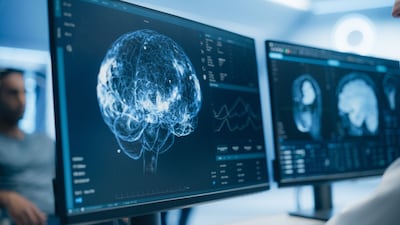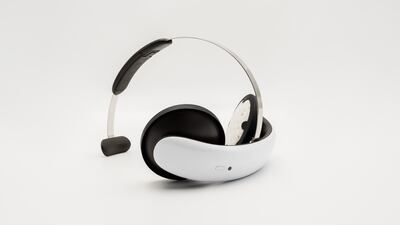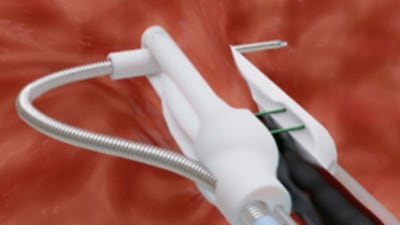John Krakauer, MindMaze’s chief medical director, believes the company’s technology platform is uniquely positioned in the digital therapeutics space, offering an immersive gaming experience to patients recovering from brain injuries, such as stroke.
MindMaze’s technology requires patients to do full body movements, requiring both cognitive and physical skills.
“We’re trying to create scalable, location-based and home-based immersive experiences that don’t need therapists all the time,” Krakauer told Medtech Insight during an interview at the recent HLTH Amsterdam conference. “This is Luke Skywalker and R2-D2,” he suggested, Luke Skywalker being the therapist and R2-D2 the digital therapeutic. “And you find a ratio of the two and that’s what we’re doing.”
“We’re trying to create scalable, location-based and home-based immersive experiences that don’t need therapists all the time.” – John Krakauer
MindPod Dolphin
One of the company’s interactive-games, MindPod Dolphin, trains fine-motor skills of the upper limb as the user controls the movement of an animated dolphin called Bandit to catch fish or explore the ocean environment.
Based on technology from Johns Hopkins University, MindPod has already shown promising results in clinical trials. In the SMARTS2 clinical trial, the game doubled the effectiveness of conventional rehabilitation therapy for the upper limbs (using the Acute Research Arm Test (ART) scale) during the sub-acute phase after a stroke, a period which lasts for a few months.
Patients started using the game within six weeks after having a stroke and were trained by licensed therapists, both in person and via video training. The game also was found to be almost equivalent to regular occupational therapy on the Fugl-Meyer Upper Extremity scale, which measures recovery in post-stroke hemiplegic patients.
“What we’re very excited about at MindMaze is that the real-world and the [clinical] trials are coming to fruition,” said Krakauer, who is also a professor of neurology and neuroscience at Johns Hopkins School of Medicine. He expressed excitement about protocols showing that high-intensity, high-dose neurorehabilitation, the foundation of MindMaze’s therapy platform, improves outcomes when given at least three times a week.
This October, the firm plans to announce preliminary results of the Enhancing Spontaneous Recovery After Stroke Study (ESPRESSo), a single-site, randomized, controlled Phase IIa trial conducted in partnership with the University of Auckland, which evaluates the effects of using MindPod for recovery in stroke patients, MindMaze said.
In 2022, MindMaze teamed up with Mount Sinai Health System in New York to deploy an outpatient neuro-restorative program followed by a home-based digital neuro-care assessment, leveraging MindMaze’s software and custom-built hardware.
MindPod has been FDA-listed since July 2019 and received the CE-mark in September 2019, according to MindMaze. It has been deployed at 30 sites serving close to 700 patients across multiple markets.
Significant Digital Neurotherapeutics Need
“We have a problem,” Krakauer said, and innovations such as MindMaze’s products could represent a solution.
While the number of available therapists is dropping worldwide, the need for treatments for diseases such as stroke, Parkinson’s disease, multiple sclerosis and at-risk aging is going up. In the UK alone, around 100,000 people have a stroke every year – roughly equivalent to one stroke every five minutes a – and only 10% of people fully recover, with some form of neuro-restorative therapy needed in 80% of cases, MindMaze says.
“The idea is that you need to start using technology in conjunction with therapists to effectively provide this high-intensity, high-dose solution.” Under the approach supported by MindMaze, patients have synchronous or personal sessions with a therapist 20% of the time while the balance of their treatment consists of at-home DTx therapy, Krakauer said.
In 2021, the Royal Buckinghamshire Hospital in Aylesbury became the first hospital in the UK to deploy the MindPod gaming system for stroke therapy. That same year, MindMaze introduced its first STEPS Rehabilitation facility in the north of the UK, featuring robotics and virtual rehabilitation technology. Krakauer calls it “the IMAX experience,” which is followed up by training at home.
“It’s an immersive room that you go into, it’s very beautiful,” Krakauer explained. “That is the mind part, which is what you do in the clinic or hospital, and the MindMotion GO [another Mindmaze neurorehabilitation game targeting patients with light- and medium-severity neurologic impairments] is for homework.” Patients “play” in the space [STEPS Rehabilitation facility] at least three times a week for 60-90 minutes.
The deployment at the UK hospital followed a $125m fundraise from London-based AlbaCore Capital Group in October 2021, used to support trials of MindMaze’s therapeutics and to expand into commercial operations. To date, MindMaze claims to have raised more than $300m in total funding.
Krakauer noted that he has also done research in animal models showing that if you combine high-intensity, high-dose behavior with drugs, you get a better response.
“The goal for the MindMaze platforms in the clinic and at home is to be the background behavior upon which you combine with drugs and physiology … that’s the real key point … you don’t see the results of the new drugs or the physiology unless they can express themselves through high-intensity, high-dose behavior.”
MindMotion GO And PRO
In 2022, MindMaze announced a partnership with Vibra Healthcare, which provides post-acute hospital care and at-home care, to deploy MindPod and MindMotion GO in select Vibra hospitals in Kentucky and California.
MindMotion GO is the outpatient, portable version of the MindMotion PRO platform, a motion capture system similar to the Microsoft Kinect used for rehabilitation of stroke and traumatic injury patients in early hospital care. In April, at the American Society of Neurorehabilitation meeting, MindMaze reported encouraging results from an ongoing study at Mount Sinai Health System evaluating a high-dose home program using MindMotion GO.
“We were able to deliver significant motor outcomes for patients through the program at a fraction of a therapist’s time required, compared to if the dose was delivered through standard of care with 1:1 therapist presence,” MindMaze said.
MindMotion PRO received US Food and Drug Administration approval in May 2017 and targets patients with severe impairments and for early hospital care; MindMotion Go, cleared by the FDA in June 2018, has been deployed at over 250 sites worldwide and used by more than 19,000 patients, according to the company.
Reimbursement
One of the biggest remaining hurdles before MindMaze is reimbursement, which is a challenge for the digital therapeutics industry as a whole. (Also see "Big Health Gets Good Night Sleep With FDA Approval Of Insomnia Digital Therapeutic" - Medtech Insight, 9 August, 2024.)
MindMaze has been granted Current Procedural Terminology Category III codes published by the American Medical Association for use of their solutions in the home setting. The company says it is working with the Swiss government on reimbursement projects. The company declined to say how much it charges clinics and patients who want to use the system at home.
Asked about plans for the remainder of the year, MindMaze CEO Tej Tadi said that the firm’s primary focus will be on strengthening distribution channels in the US and Middle Eastern markets. (Also see "Click Therapeutics Anticipates Pharma Will Begin Developing Digital Drugs From Clinical Stage" - Medtech Insight, 18 June, 2024.)
“Additionally, we are dedicated to continuing to work towards the Category III and Category I reimbursement codes in the US market, a strategic milestone that will enhance our market presence and accessibility for our customers,” Tadi said.
Krakauer admitted that the digital therapeutics industry as a whole faces numerous problems aside from reimbursement.(Also see "Big Health Gets Good Night Sleep With FDA Approval Of Insomnia Digital Therapeutic" - Medtech Insight, 9 August, 2024.)
“One, it feels very much like the poor cousin and slave to pharma. They [digital therapeutics] have a great deal of difficulty finding a way to fuse with pharma, so it’s a little bit like the blind leading the blind,” he explained. “They also can’t distinguish between digital health versus digital medicine.” He believes that digital therapeutics should be disease-modifying just like a drug is, but sometimes requires other treatments to “synergize with each other.”








